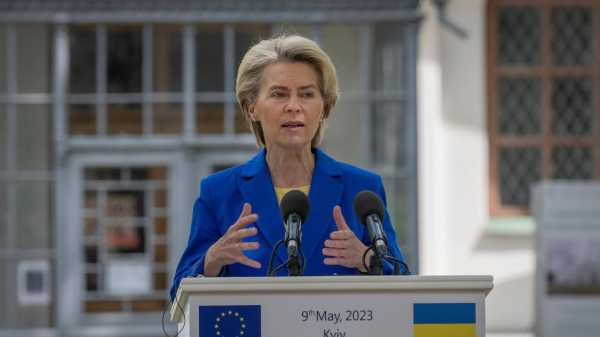
Brussels — A top European Union official on Tuesday urged the 27 member nations to take trade measures against countries that help the Kremlin to circumvent the bloc’s sanctions against Russia, sparking a warning from China that it would retaliate if targeted.
During a visit to Kyiv, European Commission President Ursula von der Leyen said the measures – which would set a new precedent for EU action – should be part of a fresh round of Russia sanctions which the member countries are discussing.
“We recently see a growth of highly unusual trade flows through the European Union and certain third countries. These goods then end up in Russia,” von der Leyen said, standing alongside Ukrainian President Volodymyr Zelenskyy.
She did not name the countries, but EU officials have raised concerns about certain flows of goods through China and Iran for some time.
“If we see that goods are going from the European Union to third countries and then end up in Russia, we could propose to the member states to sanction those goods,” von der Leyen told reporters.
All 27 members must approve any sanctions unanimously. Over the last several months, von der Leyen’s commission has become responsible for proposing what sanction action to take, leaving the member countries to thrash out their differences, sometimes over several weeks.
“This tool will be a last resort and it will be used cautiously following a very diligent risk analysis and after approval by EU member states. But there should be no doubt that we work against sanctions circumvention,” she said.
China’s foreign minister said Beijing would respond strongly if the EU took steps against Chinese companies doing legitimate business in Russia.
Speaking after a meeting with his German counterpart in Berlin, Chinese Foreign Minister Qin Gang said Beijing has laws forbidding arms deliveries to crisis regions. At the same time, he insisted that “exchange and cooperation between Chinese and Russian companies” should not be interfered with.
“We are strictly against some countries using their own domestic laws, their long arm jurisdiction, to impose one-sided sanctions against China,” Qin said, according to an official interpreter. “In such a case, we would also react strongly to this and defend the legitimate interests of our country and our companies.”
German Foreign Minister Annalena Baerbock stressed that any sanctions would target specific companies, not countries, that supply Russian arms manufacturers with critical components — including so-called dual use goods.
“This is not directed at any specific country, but rather it is directed in particular at these sanctioned goods,” she told reporters in Berlin. “But we expect of everyone, including of China, that they put pressure on their companies accordingly.”
The EU has imposed 10 rounds of sanctions on Russia since President Vladimir Putin ordered his forces into Ukraine on Feb. 24. Banks, companies and markets have been hit — even parts of the sensitive energy sector. Well over 1,000 officials are subject to asset freezes and travel bans.
Much work has involved closing loopholes so that goods vital to Putin’s war effort do not get through. However, it is the first time that plans have been announced to target trade via other countries, apart from sanctions against Iranians alleged to be supplying drones to Russia.
Past sanctions have been agreed in just months — extremely quickly for the EU. But new measures are becoming increasingly hard to endorse as they inflict damage on the economic and political interests of some member countries even as they aim for the Kremlin.
___
Frank Jordans in Berlin contributed to this report.
Sourse: abcnews.go.com






